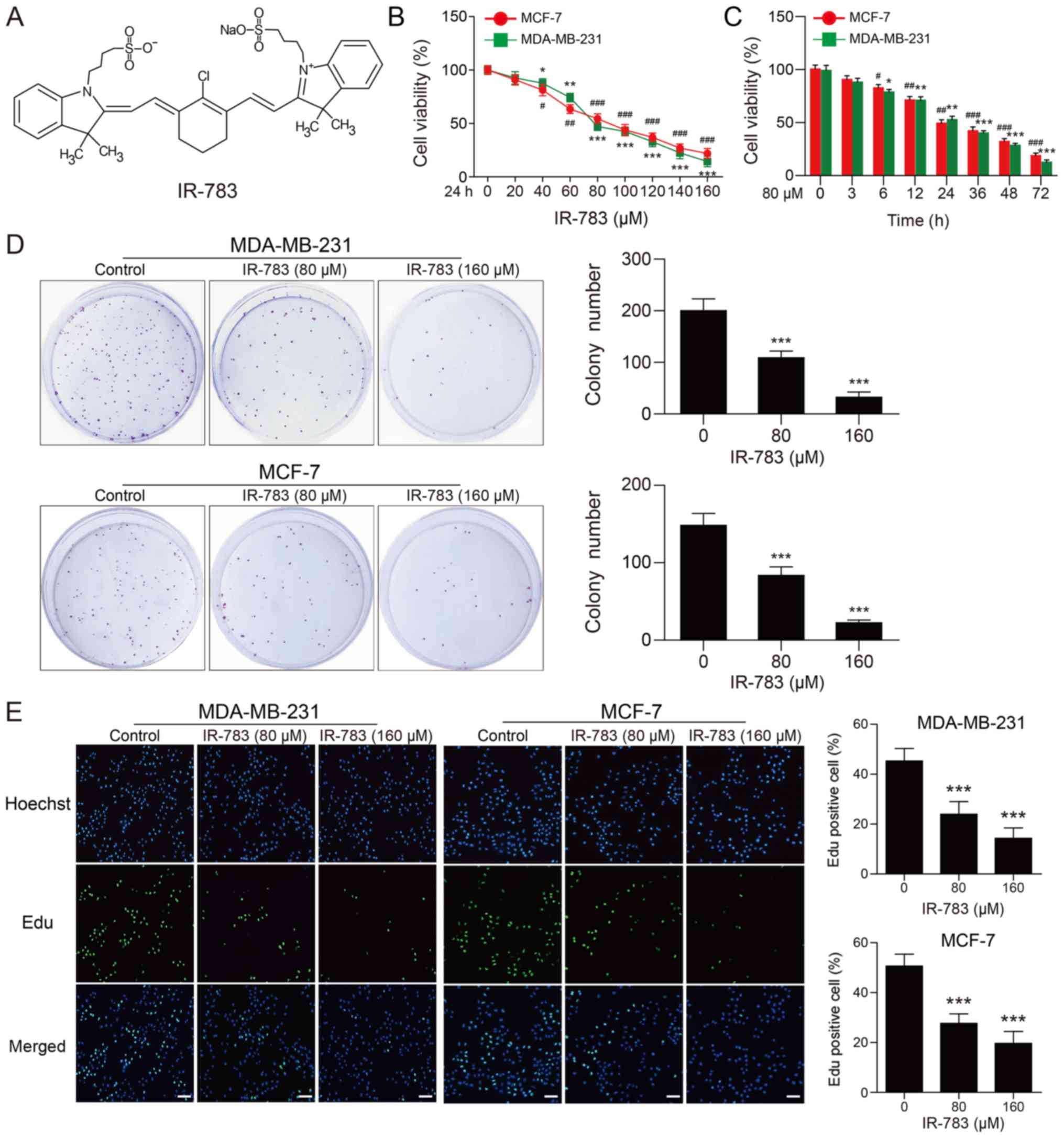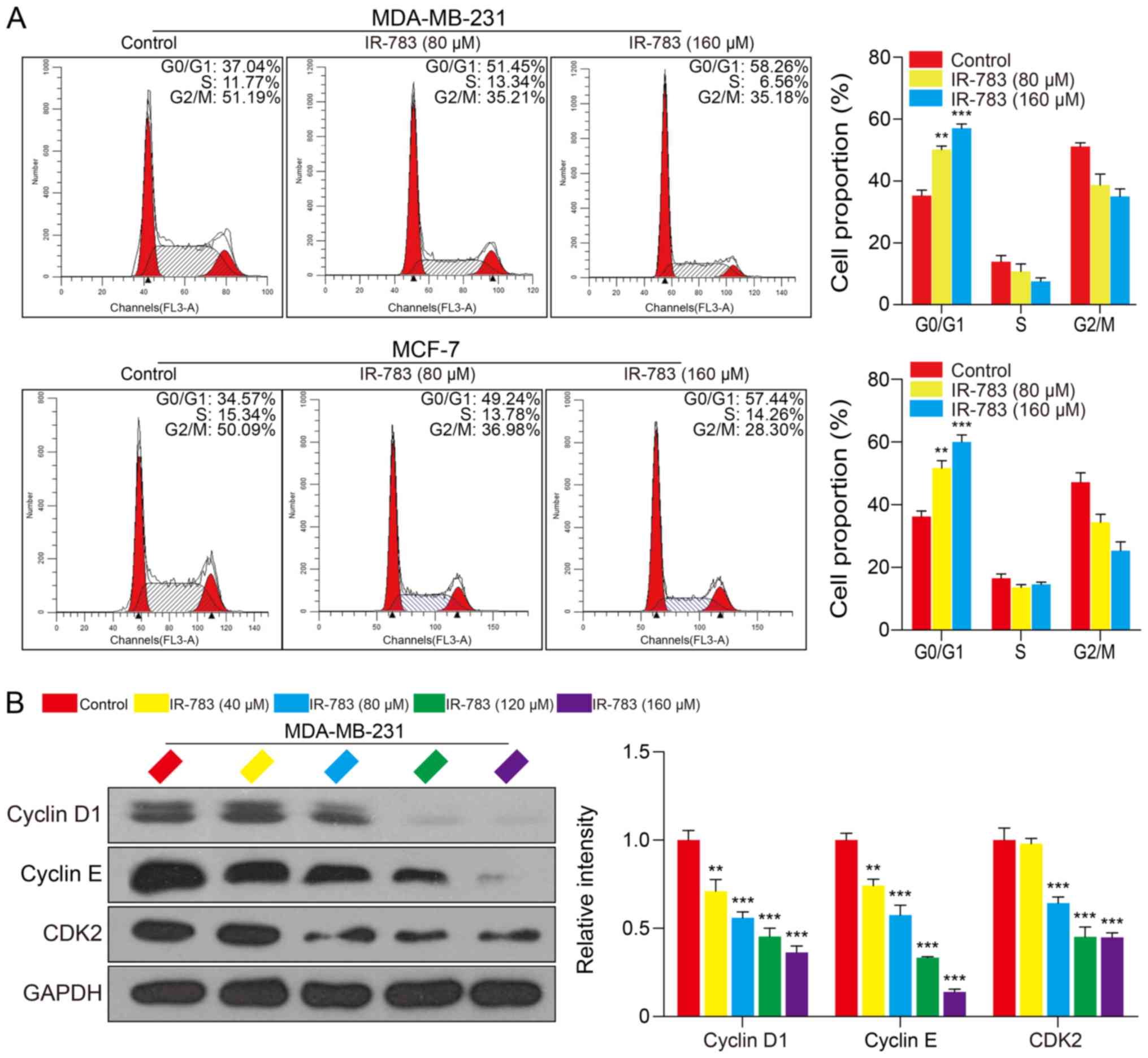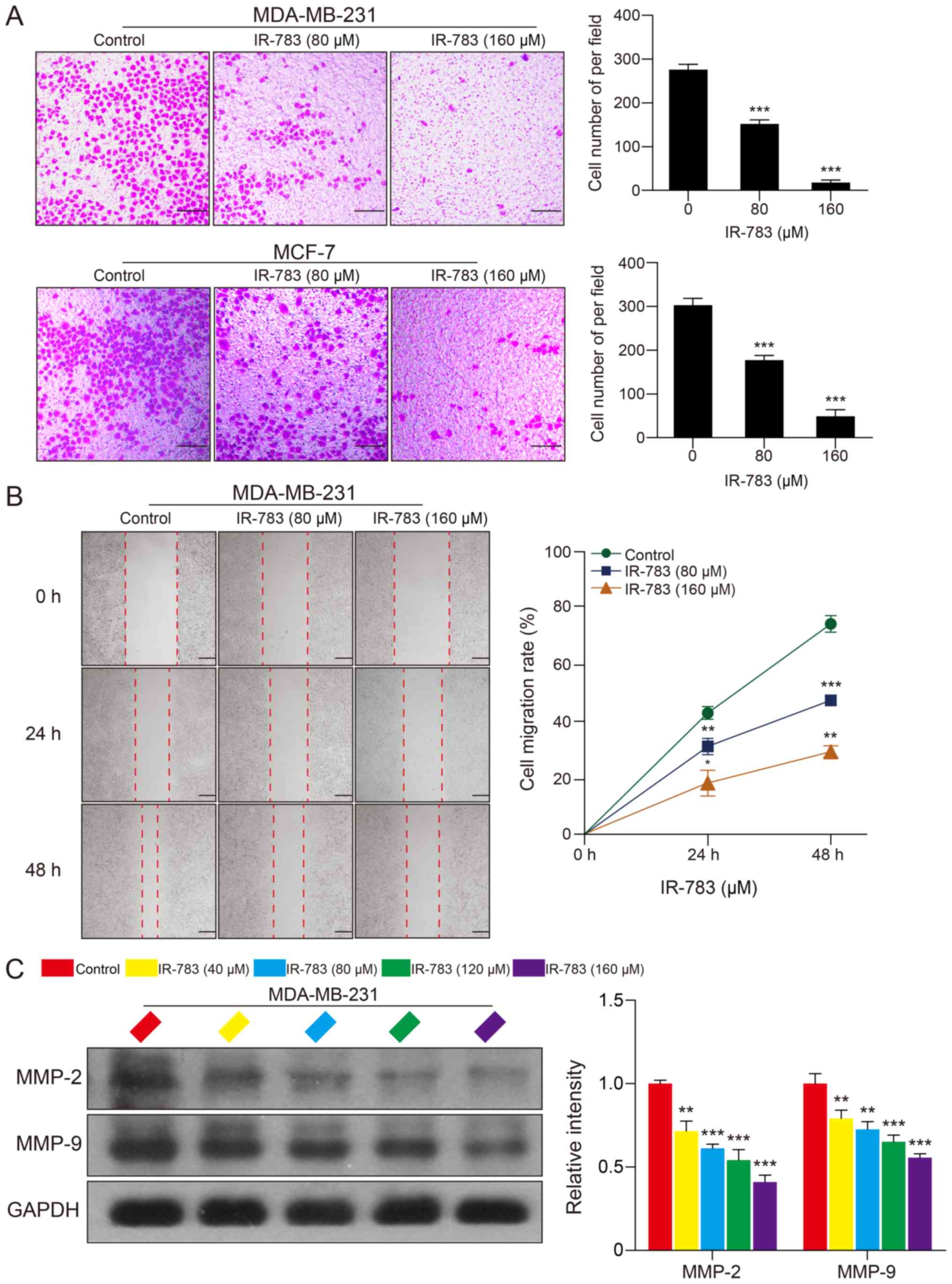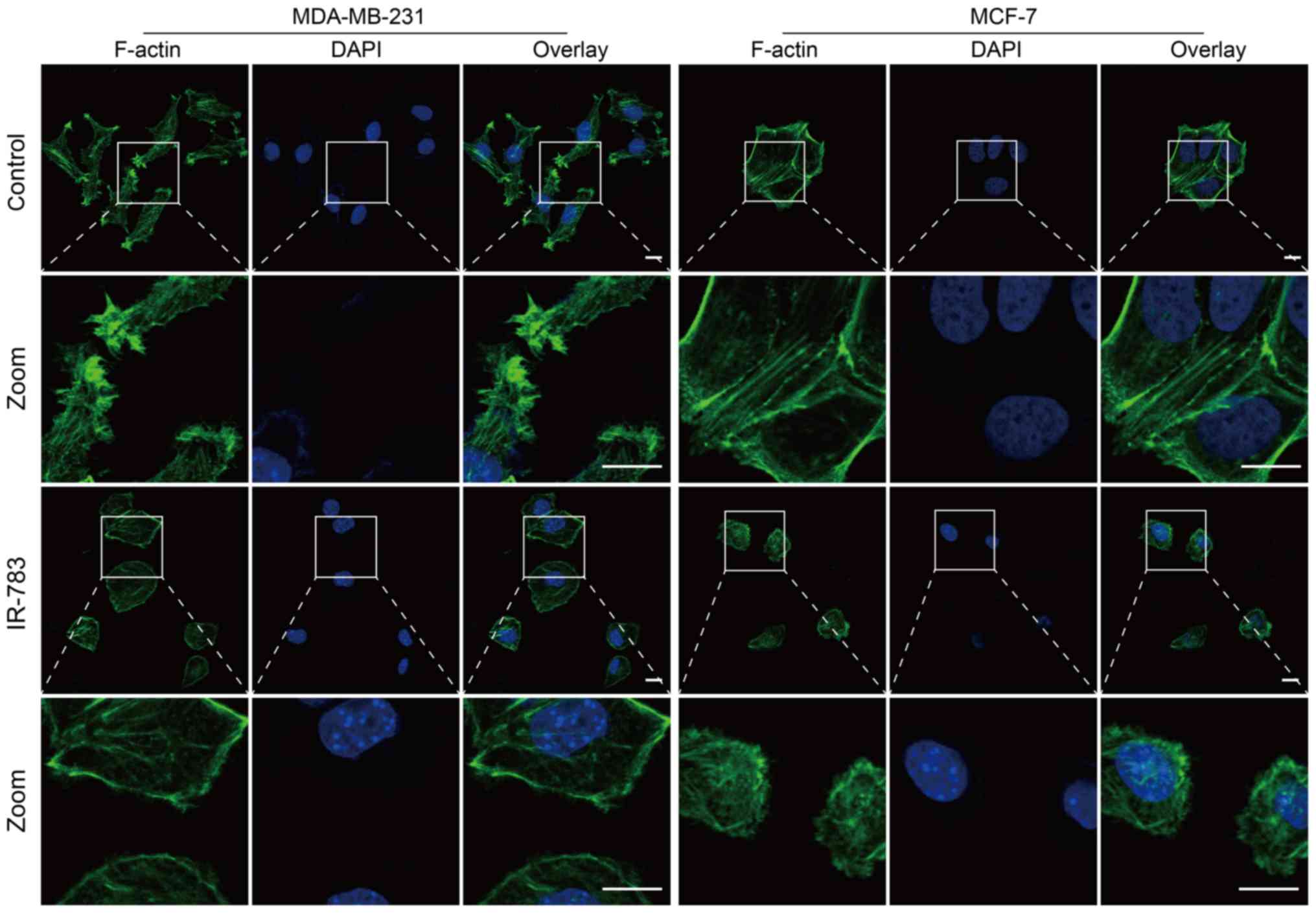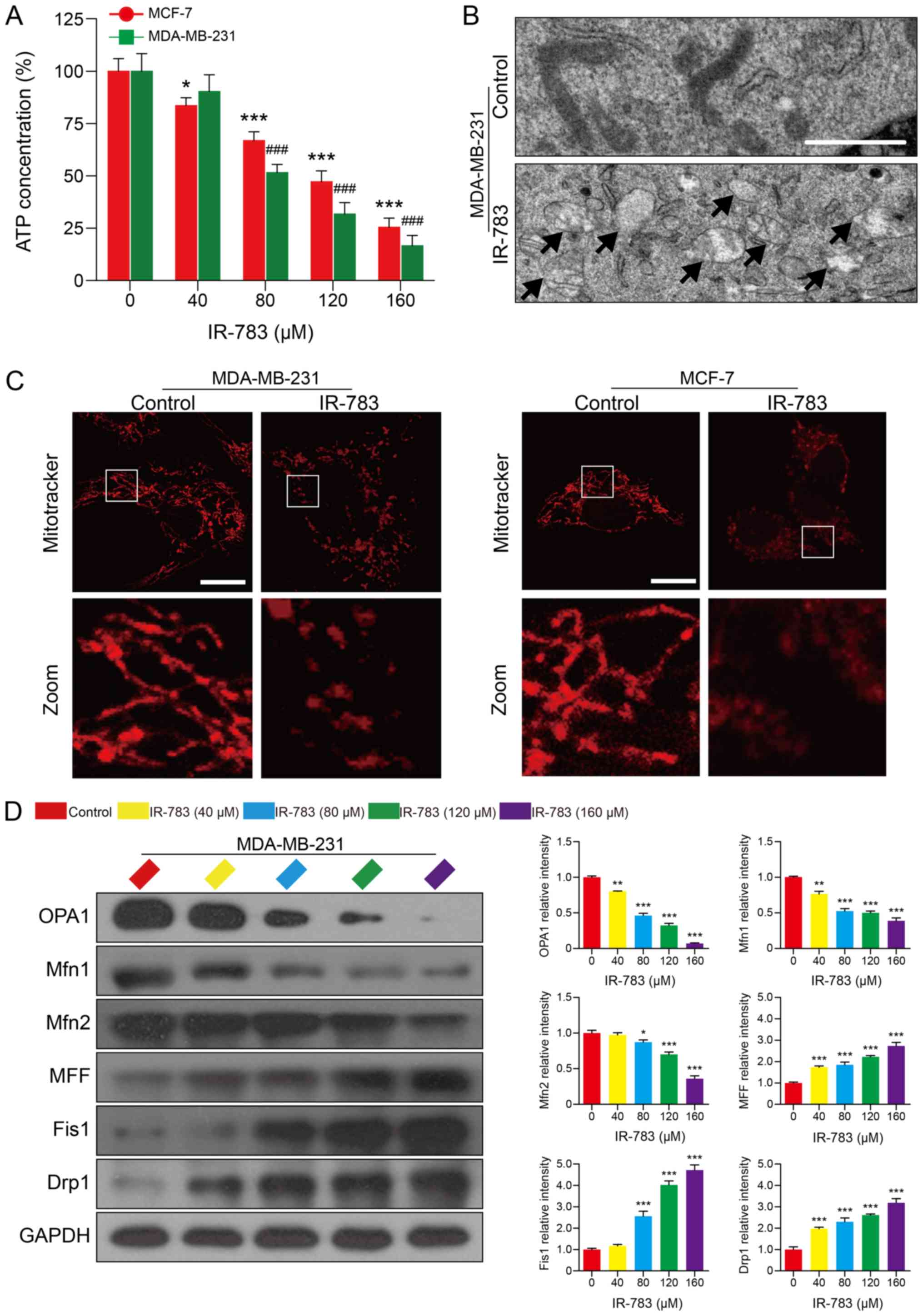|
1
|
Dai X, Li T, Bai Z, Yang Y, Liu X, Zhan J
and Shi B: Breast cancer intrinsic subtype classification, clinical
use and future trends. Am J Cancer Res. 5:2929–2943.
2015.PubMed/NCBI
|
|
2
|
Wang B, Xing Z, Wang F, Yuan X and Zhang
Y: Fangchinoline inhibits migration and causes apoptosis of human
breast cancer MDA-MB-231 cells. Oncol Lett. 14:5307–5312.
2017.PubMed/NCBI
|
|
3
|
He MY, Rancoule C, Rehailia-Blanchard A,
Espenel S, Trone JC, Bernichon E, Guillaume E, Vallard A and Magné
N: Radiotherapy in triple-negative breast cancer: Current situation
and upcoming strategies. Crit Rev Oncol Hematol. 131:96–101. 2018.
View Article : Google Scholar : PubMed/NCBI
|
|
4
|
Mathe A, Wong-Brown M, Morten B, Forbes
JF, Braye SG, Avery-Kiejda KA and Scott RJ: Novel genes associated
with lymph node metastasis in triple negative breast cancer. Sci
Rep. 5:158322015. View Article : Google Scholar : PubMed/NCBI
|
|
5
|
Jones JE, Busi SB, Mitchem JB,
Amos-Landgraf JM and Lewis MR: Evaluation of a tumor-targeting,
near-infrared fluorescent peptide for early detection and
endoscopic resection of polyps in a rat model of colorectal cancer.
Mol Imaging. 17:15360121187900652018. View Article : Google Scholar : PubMed/NCBI
|
|
6
|
Nagaya T, Okuyama S, Ogata F, Maruoka Y,
Choyke PL and Kobayashi H: Endoscopic near infrared
photoimmunotherapy using a fiber optic diffuser for peritoneal
dissemination of gastric cancer. Cancer Sci. 109:1902–1908. 2018.
View Article : Google Scholar : PubMed/NCBI
|
|
7
|
Yang X, Shao C, Wang R, Chu CY, Hu P,
Master V, Osunkoya AO, Kim HL, Zhau HE and Chung LWK: Optical
imaging of kidney cancer with novel near infrared heptamethine
carbocyanine fluorescent dyes. J Urol. 189:702–710. 2013.
View Article : Google Scholar
|
|
8
|
Holt D, Okusanya O, Judy R, Venegas O,
Jiang J, DeJesus E, Eruslanov E, Quatromoni J, Bhojnagarwala P,
Deshpande C, et al: Intraoperative near-infrared imaging can
distinguish cancer from normal tissue but not inflammation. PLoS
One. 9:e1033422014. View Article : Google Scholar : PubMed/NCBI
|
|
9
|
Deng G, Li S, Sun Z, Li W, Zhou L, Zhang
J, Gong P and Cai L: Near-infrared fluorescence imaging in the
largely unexplored window of 900-1,000 nm. Theranostics.
8:4116–4128. 2018. View Article : Google Scholar : PubMed/NCBI
|
|
10
|
Wu JB, Shi C, Chu GC, Xu Q, Zhang Y, Li Q,
Yu JS, Zhau HE and Chung LW: Near-infrared fluorescence
heptamethine carbo-cyanine dyes mediate imaging and targeted drug
delivery for human brain tumor. Biomaterials. 67:1–10. 2015.
View Article : Google Scholar : PubMed/NCBI
|
|
11
|
Shao C, Liao CP, Hu P, Chu CY, Zhang L,
Bui MH, Ng CS, Josephson DY, Knudsen B, Tighiouart M, et al:
Detection of live circulating tumor cells by a class of
near-infrared heptamethine carbocyanine dyes in patients with
localized and metastatic prostate cancer. PLoS One. 9:e889672014.
View Article : Google Scholar : PubMed/NCBI
|
|
12
|
Cohen S and Margel S; S. C S M:
Engineering of near IR fluorescent albumin nanoparticles for in
vivo detection of colon cancer. J Nanobiotechnology. 10:362012.
View Article : Google Scholar : PubMed/NCBI
|
|
13
|
Zhang J, Liu Z, Lian P, Qian J, Li X, Wang
L, Fu W, Chen L, Wei X and Li C: Selective imaging and cancer cell
death via pH switchable nearinfrared fluorescence and photothermal
effects. Chem Sci. 7:5995–6005. 2016. View Article : Google Scholar : PubMed/NCBI
|
|
14
|
Thomas RG and Jeong YY: NIRF heptamethine
cyanine dye nanocomplexes for multi modal theranosis of tumors.
Chonnam Med J. 53:83–94. 2017. View Article : Google Scholar : PubMed/NCBI
|
|
15
|
Tang Q, Liu W, Zhang Q, Huang J, Hu C, Liu
Y, Wang Q, Zhou M, Lai W, Sheng F, et al: Dynamin-related protein
1-mediated mitochondrial fission contributes to IR-783-induced
apoptosis in human breast cancer cells. J Cell Mol Med.
22:4474–4485. 2018. View Article : Google Scholar : PubMed/NCBI
|
|
16
|
Hou L, Yang X, Ren J, Wang Y, Zhang H,
Feng Q, Shi Y, Shan X, Yuan Y and Zhang Z: A novel redox-sensitive
system based on single-walled carbon nanotubes for
chemo-photothermal therapy and magnetic resonance imaging. Int J
Nanomedicine. 11:607–624. 2016.PubMed/NCBI
|
|
17
|
Tokarz P and Blasiak J: Role of
mitochondria in carcinogenesis. Acta Biochim Pol. 61:671–678. 2014.
View Article : Google Scholar : PubMed/NCBI
|
|
18
|
Eirin A, Lerman A and Lerman LO:
Mitochondria: A pathogenic paradigm in hypertensive renal disease.
Hypertension. 65:264–270. 2015. View Article : Google Scholar :
|
|
19
|
Ruan S, Zhang Z, Tian X, Huang D, Liu W,
Yang B, Shen M and Tao F: Compound fuling granule suppresses
ovarian cancer development and progression by disrupting
mitochondrial function, galactose and fatty acid metabolism. J
Cancer. 9:3382–3393. 2018. View Article : Google Scholar : PubMed/NCBI
|
|
20
|
Scott I and Youle RJ: Mitochondrial
fission and fusion. Essays Biochem. 47:85–98. 2010. View Article : Google Scholar : PubMed/NCBI
|
|
21
|
Han XJ, Yang ZJ, Jiang LP, Wei YF, Liao
MF, Qian Y, Li Y, Huang X, Wang JB, Xin HB, et al: Mitochondrial
dynamics regulates hypoxia-induced migration and antineoplastic
activity of cisplatin in breast cancer cells. Int J Oncol.
46:691–700. 2015. View Article : Google Scholar
|
|
22
|
Matsuishi YI, Kato H, Masuda K, Yamaza H,
Hirofuji Y, Sato H, Wada H, Kiyoshima T and Nonaka K: Accelerated
dentinogenesis by inhibiting the mitochondrial fission factor,
dynamin related protein 1. Biochem Biophys Res Commun.
495:1655–1660. 2018. View Article : Google Scholar
|
|
23
|
Archer SL: Mitochondrial dynamics -
mitochondrial fission and fusion in human diseases. N Engl J Med.
369:2236–2251. 2013. View Article : Google Scholar : PubMed/NCBI
|
|
24
|
Westermann B: Mitochondrial fusion and
fission in cell life and death. Nat Rev Mol Cell Biol. 11:872–884.
2010. View Article : Google Scholar : PubMed/NCBI
|
|
25
|
Eatemadi A, Aiyelabegan HT, Negahdari B,
Mazlomi MA, Daraee H, Daraee N, Eatemadi R and Sadroddiny E: Role
of protease and protease inhibitors in cancer pathogenesis and
treatment. Biomed Pharmacother. 86:221–231. 2017. View Article : Google Scholar
|
|
26
|
Han S, Huang J, Liu B, Xing B, Bordeleau
F, Reinhart-King CA, Li W, Zhang JJ and Huang XY: Improving fascin
inhibitors to block tumor cell migration and metastasis. Mol Oncol.
10:966–980. 2016. View Article : Google Scholar : PubMed/NCBI
|
|
27
|
Shibue T, Brooks MW, Inan MF, Reinhardt F
and Weinberg RA: The outgrowth of micrometastases is enabled by the
formation of filopodium-like protrusions. Cancer Discov. 2:706–721.
2012. View Article : Google Scholar : PubMed/NCBI
|
|
28
|
Atilgan E, Wirtz D and Sun SX: Mechanics
and dynamics of actin-driven thin membrane protrusions. Biophys J.
90:65–76. 2006. View Article : Google Scholar
|
|
29
|
Ke R, Xu Q, Li C, Luo L and Huang D:
Mechanisms of AMPK in the maintenance of ATP balance during energy
metabolism. Cell Biol Int. 42:384–392. 2018. View Article : Google Scholar
|
|
30
|
Wang X, Li Y, Qian Y, Cao Y, Shriwas P,
Zhang H and Chen X: Extracellular ATP, as an energy and
phosphorylating molecule, induces different types of drug
resistances in cancer cells through ATP internalization and
intracellular ATP level increase. Oncotarget. 8:87860–87877.
2017.PubMed/NCBI
|
|
31
|
Yang X, Shi C, Tong R, Qian W, Zhau HE,
Wang R, Zhu G, Cheng J, Yang VW, Cheng T, et al: Near IR
heptamethine cyanine dye-mediated cancer imaging. Clin Cancer Res.
16:2833–2844. 2010. View Article : Google Scholar : PubMed/NCBI
|
|
32
|
Yuan J, Yi X, Yan F, Wang F, Qin W, Wu G,
Yang X, Shao C and Chung LW: Near infrared fluorescence imaging of
prostate cancer using heptamethine carbocyanine dyes. Mol Med Rep.
11:821–828. 2015. View Article : Google Scholar
|
|
33
|
Papaccio F, Paino F, Regad T, Papaccio G,
Desiderio V and Tirino V: Concise Review: Cancer cells, cancer stem
cells, and mesenchymal stem cells: Influence in cancer development.
Stem Cells Transl Med. 6:2115–2125. 2017. View Article : Google Scholar : PubMed/NCBI
|
|
34
|
Sun L, Huang Y, Wei Q, Tong X, Cai R,
Nalepa G and Ye X: Cyclin E-CDK2 protein phosphorylates plant
homeodomain finger protein 8 (PHF8) and regulates its function in
the cell cycle. J Biol Chem. 290:4075–4085. 2015. View Article : Google Scholar :
|
|
35
|
Zhang R, Wei YH, Zhao CY, Song HY, Shen N,
Cui X, Gao X, Qi ZT, Zhong M and Shen W: EDIL3 depletion suppress
epithelial-mesenchymal transition of lens epithelial cells via
transforming growth factor β pathway. Int J Ophthalmol. 11:18–24.
2018.
|
|
36
|
Gupta GP and Massagué J: Cancer
metastasis: Building a framework. Cell. 127:679–695. 2006.
View Article : Google Scholar : PubMed/NCBI
|
|
37
|
Benson CS, Babu SD, Radhakrishna S,
Selvamurugan N and Ravi Sankar B: Expression of matrix
metalloproteinases in human breast cancer tissues. Dis Markers.
34:395–405. 2013. View Article : Google Scholar : PubMed/NCBI
|
|
38
|
Mendes O, Kim HT and Stoica G: Expression
of MMP2, MMP9 and MMP3 in breast cancer brain metastasis in a rat
model. Clin Exp Metastasis. 22:237–246. 2005. View Article : Google Scholar : PubMed/NCBI
|
|
39
|
Flamini MI, Fu X-D, Sanchez AM, Giretti
MS, Garibaldi S, Goglia L, Pisaneschi S, Tosi V, Genazzani AR and
Simoncini T: Effects of raloxifene on breast cancer cell migration
and invasion through the actin cytoskeleton. J Cell Mol Med.
13:2396–2407. 2009. View Article : Google Scholar
|
|
40
|
Li Y, Zhang Z, Zhou X, Li L, Liu Q, Wang
Z, Bai X, Zhao Y, Shi H, Zhang X, et al: The oncoprotein HBXIP
enhances migration of breast cancer cells through increasing
filopodia formation involving MEKK2/ERK1/2/Capn4 signaling. Cancer
Lett. 355:288–296. 2014. View Article : Google Scholar : PubMed/NCBI
|
|
41
|
Ozawa S, Ueda S, Imamura H, Mori K,
Asanuma K, Yanagita M and Nakagawa T: Glycolysis, but not
Mitochondria, responsible for intracellular ATP distribution in
cortical area of podocytes. Sci Rep. 5:185752015. View Article : Google Scholar : PubMed/NCBI
|
|
42
|
Tang D, Kang R, Livesey KM, Kroemer G,
Billiar TR, Van Houten B, Zeh HJ III and Lotze MT: High-mobility
group box 1 is essential for mitochondrial quality control. Cell
Metab. 13:701–711. 2011. View Article : Google Scholar : PubMed/NCBI
|
|
43
|
Newell C, Shutt TE, Ahn Y, Hittel DS, Khan
A, Rho JM and Shearer J: Tissue specific impacts of a ketogenic
diet on mitochondrial dynamics in the BTBRT+tf/j mouse. Front
Physiol. 7:6542016. View Article : Google Scholar
|
|
44
|
Kar R, Mishra N, Singha PK, Venkatachalam
MA and Saikumar P: Mitochondrial remodeling following fission
inhibition by 15d-PGJ2 involves molecular changes in mitochondrial
fusion protein OPA1. Biochem Biophys Res Commun. 399:548–554. 2010.
View Article : Google Scholar : PubMed/NCBI
|















